
The Institution of Engineers (India), the IEI, is a national organization for engineers in India. It is the world's largest multi-disciplinary engineering professional society. It has more than one million members in 15 engineering disciplines. The institution was established in 1920 in Kolkata, West Bengal, and was incorporated by Royal Charter in 1935. It is currently headquartered at 8 Gokhale Road, Kolkata.

National Institute of Technology Warangal is a public technical and research university located in Warangal, India. It is recognised as an Institute of National Importance by the Government of India. The foundation stone for this institute was laid by then Prime Minister Jawaharlal Nehru on 1959, the first in the chain of 31 NITs in the country. The institute was renamed as the National Institute of Technology, Warangal in 2002.
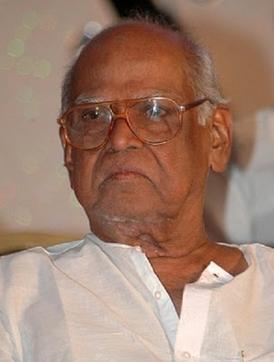
Sattiraju Lakshminarayana, known professionally as Bapu, was an Indian film director, painter, illustrator, cartoonist, screenwriter, music artist, and designer known for his works in Telugu cinema, and Hindi cinema. In 2013, he was awarded the Padma Shri, for his contribution to Indian art and cinema. He has garnered two National Honors, two National Film Awards, seven state Nandi Awards, two Filmfare Awards South, a Raghupathi Venkaiah Award, and a Filmfare Lifetime Achievement Award – South.

The Indian Institute of Advanced Study (IIAS) is a research institute located in Shimla, India. It was set up by the Ministry of Education, Government of India in 1964 and started functioning from 20 October 1965. It is currently housed in the Rashtrapati Niwas.
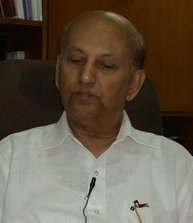
Udupi Ramachandra Rao was an Indian space scientist and former chairman of the Indian Space Research Organisation. He was also the Chairman of the Governing Council of the Physical Research Laboratory at Ahmedabad and Nehru Planetarium at Bengaluru and chancellor of the Indian Institute for Space Science and Technology (IIST) at Thiruvananthapuram. He is known as "The Satellite Man of India". He pioneered India's first satellite launch Aryabhata in 1975.

Hrishikesh Mukherjee was an Indian film director, editor and writer. He is regarded as one of the greatest filmmakers of Indian cinema. Popularly known as Hrishi-da, he directed 42 films during his career spanning over four decades, and is named the pioneer of the 'middle cinema' of India. Renowned for his social films that reflected the changing middle-class ethos, Mukherjee "carved a middle path between the extravagance of mainstream cinema and the stark realism of art cinema".
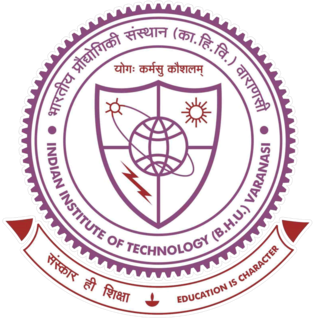
Indian Institute of Technology Varanasi(IIT-BHU) is a public technical university located in Varanasi, Uttar Pradesh, India. Founded in 1919 as the Banaras Engineering College, it became the Institute of Technology, Banaras Hindu University in 1968. It was later designated an Indian Institute of Technology in 2012. IIT (BHU) Varanasi has 16 departments, 3 inter-disciplinary schools and 1 Humanities & Social Sciences Section. It is located inside the Banaras Hindu University Campus.

Mylswamy Annadurai, popularly known as Moon Man of India, is an Indian scientist working as vice president for Tamil Nadu State Council for Science and Technology (TNSCST), Chairman, Board of Governors, National Design and Research Forum(NDRF. He was born on 2 July 1958, in a village called Kothavadi near Pollachi in Coimbatore district, Tamil Nadu state of India). Prior to taking this assignment he was with Indian Space Research Organisation and served as Director, ISRO Satellite Centre (ISAC), Bangalore. During his 36 years of service in ISRO, he had some of the major contributions, including two of the major missions of ISRO, namely Chandrayaan-1 and Mangalyaan. Annadurai has been listed among 100 Global thinkers of 2014 and topped the innovators list. His works are mentioned in textbooks of Tamil Nadu Board of Secondary Education
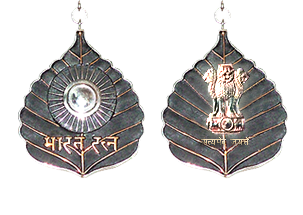
The Indian honours system is the system of awards given to individuals for a variety of services to the Republic of India. The categories of awards are as follows:
The Shastri Indo-Canadian Institute is a binational non-profit organization with registered charity status in Canada. The institute supports the creation of binational links between academia, government, the business community and civil society organizations by funding research and hosting seminars. It provides grants as well as internships and fellowships to provide opportunities for individuals to gain first-hand experience in India or Canada in their field of expertise. Furthermore, the Institute serves as a liaison between educational institutions and the Indian diaspora in Canada. Dr. B. Hariharan, Professor and Head, Institute of English, for the University of Kerala, is the president of the organization.
Nautam Bhagwanlal Bhatt was an Indian physicist born in Jamnagar, Gujarat. He was the founding Director Solid State Physics Laboratory, Delhi. Nautam was a recipient of Padma Shri Award for his contributions to "Science and Engineering".
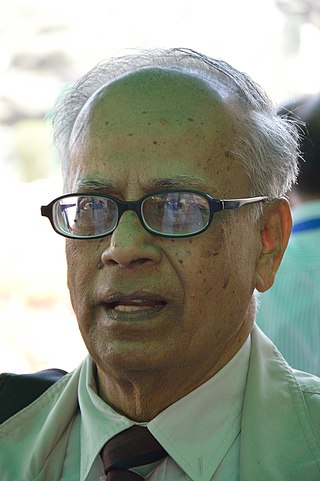
Saroj Ghose is an Indian science popularizer and museum maker. He was the director of Birla Industrial & Technological Museum and director general of the National Council of Science Museums, Government of India. He was also the President of the International Council of Museums in Paris during 1992–98. He won many awards including one for "Best Effort in Science Popularisation Amongst Children". He has also mentored some of India's best Museum Developers.

The Pradhan Mantri Rashtriya Bal Puraskar, formerly called the National Child Award for Exceptional Achievement, is India’s highest civilian honour for children, awarded annually by the Ministry of Women and Child Development.
Brahm Prakash, was a metallurgist known for his work with nuclear materials in India.

Deepak B. Phatak is an Indian computer scientist and academic, and a recipient of the Padma Shri Award for his contribution in science and technology in 2013. He is known for his notable work for upgrading Aakash, advertised by its manufacturer as the 'world's cheapest tablet'. In 2009, he was ranked one of the 50 most powerful people in India.
Chandrathil Gouri Krishnadas Nair is an Indian technocrat, teacher and metallurgical scientist known for his contributions in the field of aeronautical metallurgy. Dr Nair was given the Padma Shri Award by the Government of India for his contributions to science and technology in 2001.

Brahma Singh is an Indian Horticultural scientist, known for his expertise on protected cultivation and his efforts in developing agro-technologies for the high altitude areas of the Himalayan region of Leh and for identifying and popularizing the fruit crops of seabuckthorn and Indian mulberry (Noni). The Government of India honoured him, in 2014, by awarding him the Padma Shri, the fourth highest civilian award, for his contributions to the fields of science and technology.

Anitha Pauldurai is an Indian basketball player who has been the captain of the India women's national basketball team. She has been conferred with National Civilian Award Padma Shri in 2021. She has been also conferred with Chief Minister State award in the field of sports by Government of Tamilnadu in 2013.

Ashwani Pareek is Executive Director of NABI a prominent plant biologist and educator noted chiefly for his contribution in plant molecular biology and biotechnology. He is currently working as Professor of plant molecular biology and biotechnology at the School of Life Sciences, Jawaharlal Nehru University, New Delhi, and adjunct professor at the University of Western Australia, Perth, Australia. He is a recipient of several honors including the Visitors award for Technology Development from the President of India for developing Stress Tolerant Rice of the Next Generation (STRONG) that has the potential to enhance the income of rice farmers. The award ceremony was held at the Rashtrapati Bhawan on 2 May 2018. Recently on 26 February 2020, he has been awarded "Tata Innovation Award 2020" by Department of Biotechnology, Govt of India. He has interest in understanding the physiological and molecular adaptations in xero-halophytic plants and development of transgenic rice plants with enhanced tolerance towards multiple abiotic stresses.















